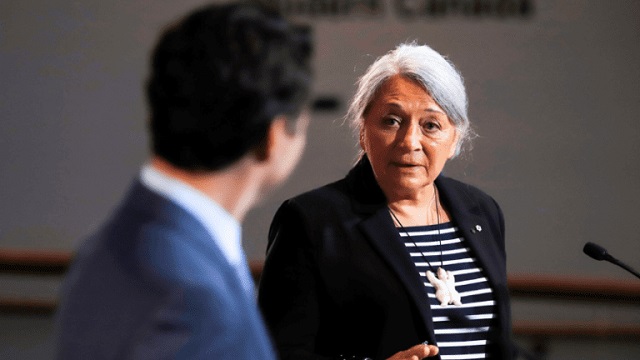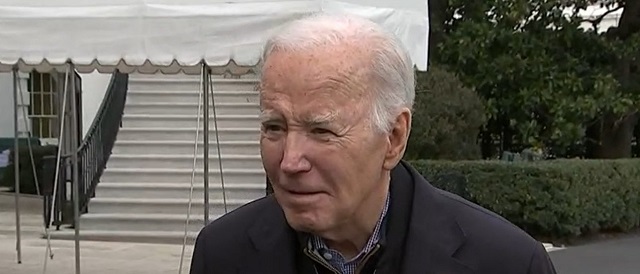MacDonald Laurier Institute
Liberalism’s civil war in the reaction to Hamas’ attack

From the MacDonald Laurier Institute
By Michael Bonner
Where is the “fine line” between free speech and offence or hatred and what does it mean not to feel safe sharing an opinion?
Are we living through an illiberal or anti-liberal moment? Observers on both poles of the political spectrum say that we are. They cite things like pulling down statues, cancel culture, contests about pronouns, online or in-person mobs, campus social justice crusades, and so on. Leftists are “woke authoritarians”, and the Right are all inspired by Hitler. Both sides assert their positions are nothing more than a defence of fundamental freedoms and accuses the other of trying to crush it. Words like “fascist”, “communist”, and “Nazi” are thrown about without clarity or precision, and each side accuses the other of undermining liberal democracy.
Now, each side in this contest is right that liberalism is under strain, but not in the way they think. Or at least, not always. Most of the strife that we have been witnessing for the past decade is not a barbarian horde hammering away at the outer defences of the liberal empire, but a civil war unfolding within it. Those on the Left who demand “safe spaces”, trigger warnings, deplatforming speakers, or cancelling of opponents with views deemed offensive often do so in the name of protecting of individual freedom or autonomy, as they understand them. And their antagonists do not oppose those things because they reject individual freedom. Far from it. Their opposition amounts to asserting other liberal values, most especially free speech and academic freedom. The outcome is a conflict between antithetical visions of liberal freedoms.
Ideally, the liberal civil war could be ended easily. Everybody would accept some reasonable limit on his or her own personal freedoms, and respect those of everybody else. Those reasonable limits used to be determined by inherited custom and habit — what some people still vestigially refer to as “norms”. You should be able to say and do what you want, but there were things that you ought not to want to say or do. Consensus held that deliberate obscenity, blasphemy, insult, and so forth, should be avoided. Such things did not always need to be outlawed; but, if they were, it was simply because law aligned with custom.
Now, it is doubtful whether any such consensual norms still exist in the postmodern West where so much emphasis is placed on individual preferences to the detriment of a harmonious society. Or, if norms still obtain, their power to shape public morality and behaviour seems greatly diminished. In the absence of shared norms, the purpose of the law becomes simply to punish the infringement of a code of conduct which a society, or a part thereof, is incapable of understanding or doesn’t see any valuing in adhering to, and this is a serious problem.
We have a symbol of this problem in the reaction to Hamas’s attack on Israel on October 7 last year. Governments, police, and university authorities have struggled to differentiate between antithetical, but equally permissible, political views and expressions of hatred or efforts to intimidate others. Former president of Harvard, Claudine Gay, was asked at an American congressional hearing whether a hypothetical call for the genocide of Jews would be a violation of Harvard’s code of conduct. “It can be, depending on the context” was her answer, and this can be taken as the high-water mark of the confusion — especially in contrast with Harvard’s iron-fisted policy on “sizeism,” “fatphobia”, “cisheterosexism,” and Hallowe’en costumes. An ever-expanding list of new crimes that no one had heard of a few years ago must always be punished severely, but a demand for mass-murder may be allowed in certain contexts, apparently.
In Canada, we have seen many emotive reactions both to the attack of October 7 and Israel’s campaign against Hamas. The death of civilians has provoked disgust and condemnation, and there have been many public protests. But some of these seem to have less to do with sympathy for victims than hatred for the other side, and their form and venue are wholly inappropriate. Ostensibly pro-Gazan demonstrations have been directed at Jewish community centres, schools, and restaurants which have no connection with Israeli military policy. A protest on the overpass at Avenue Road and the 401 in Toronto was effectively a blockade of a predominately Jewish neighbourhood.
Meanwhile, the Canadian Senate recently released a report alleging a substantial rise in incidents of Islamophobia. A mosque in Toronto was vandalised, and faeces was smeared on an Islamic centre in Ottawa — two institutions that have no connection with Hamas.
Observers unsurprisingly demand moderation. Canada’s Centre for Israel and Jewish Affairs has called for “reasonable limits” to public protest, so as to exclude deliberate intimidation. Israel’s ambassador to Canada has warned of a “fine line” between freedom of speech and what he calls “freedom of hate.” And Amira Elghawaby, Canada’s federal Anti-Islamophobia Envoy, seems to encourage a renewed commitment to free speech, which seems to have been stifled, since “Canada’s Muslim, Arab and Palestinian communities right now do not feel fully safe to share their views on what’s happening in Gaza”.
Unfortunately, such exhortations, well-meaning and reasonable though they may be, will probably not have any beneficial effect. No moderation or limitation will be possible unless people can agree on where that “fine line” is, what it means to be “fully safe”, what public protest ought to look like, and where it should take place. In the absence of public consensus on those matters, governments may be forced to legislate. Karamveer Lalh has argued that spontaneous protest could be restricted to areas around government buildings and possibly forbidden elsewhere without a permit. Such a policy would not be above criticism, but it would at least attempt a balance between civil liberties and the state’s duty to protect its citizens. But if this failed, as it very well could, more draconian measures would surely follow.
Increasingly rigorous guidance and crackdowns on the location of public protests, though, would not address the other questions. Where is the “fine line” between free speech and offence or hatred and what does it mean not to feel safe sharing an opinion? Society cannot define and punish mere offence by relying on the subjective experience of individuals, as there is no form of speech that will not potentially offend someone.
Hate speech is a different matter. But the bar for hate speech is already so high that it is not even clear where it is. Our present law is directed against very extreme expressions of vilification and detestation, not mere disliking or antipathy. Obviously, it would be bad to find oneself on the wrong side of this law, but that happens rarely. Nevertheless, the fear that political opinions could potentially be construed as support for mass-murder has been enough to get some people fired or censured. Amira Elghawaby’s implication that one should feel safe to utter an opinion seems reasonable in principle, but this cannot mean that there should no prospect of objection or reaction.
And so, we find ourselves back in the middle of the liberal civil war. Though it is tempting to assert that the main solution to the problem is a renewed commitment to liberal freedoms, this cannot be right. Everyone already seems to believe in one vision or another of those freedoms, even —perhaps especially — when they conflict. The law may succeed in punishing people, and it may even reimpose order for a time. But can it teach us to be civil and to disagree peacefully? We are going to find out soon.
Dr Michael Bonner is a political consultant and former Director of Policy within the Government of Ontario. He is also a historian of ancient Iran and is the author of the new book In Defense of Civilization: How Our Past Can Renew Our Present.
Business
Proposed changes to Canada’s Competition Act could kneecap our already faltering economy

From the Macdonald Laurier Institute
Aaron Wudrick, for Inside Policy
No party wants to be seen as soft on “big business” but that is a bad reason to pass potentially harmful, counterproductive competition policy legislation.
The recent federal budget was widely panned – in particular by the entrepreneurial class – for its proposal to raise the capital gains inclusion rate. As it turns out, “soak the rich” might sound like clever politics (it’s not) but it’s definitely a poor narrative if your goal is to incentivize and encourage risk-taking and investment.
But while this damaging measure in the federal budget has at least drawn plenty of public ire, other harmful legislative changes are afoot that are getting virtually no attention at all. They’re contained in Bill C-59 – the omnibus bill still wending its way through Parliament to enact measures contained in last fall’s economic statement – and consist of major proposed amendments to Canada’s Competition Act. The lack of coverage and debate on these changes is all the more concerning given that, if enacted, they could have a long-term negative impact on our economy comparable to the capital gains inclusion rate hike.
Worst of all, the most potentially damaging changes weren’t even in the original bill, but were brought forward by the NDP at the House of Commons Standing Committee on Finance, and are lifted directly from a previous submission made to the committee by the Commissioner of Competition himself. In effect, they would change competition law to put a new onus on businesses to prove a negative: that having a large market share isn’t harmful to consumers.
MPs on the committee have acknowledged they don’t really understand the changes – they involve a “concentration index” described as “the sum of the squares of the market shares of the suppliers or customers” – but the government itself previously cast doubt on the need for this additional change. It’s obvious that a lot of politics are at play here: no party wants to be seen as soft on “big business.” But this is about much more than “big business.” It’s about whether we want to enshrine in law unfounded, and potentially very harmful, assumptions about how competition operates in the real world.
The changes in question are what are known in legal circles as “structural presumptions” – which, as the name implies, involve creating presumptions in law based on market “structure” – in this case, regarding the concentration level of a given market. Presumptions in law matter, because they determine which side in a competition dispute – the regulatory authority, or the impugned would-be merging parties – bears the burden of proof.
So why is this a bad idea? There are at least three reasons.
First of all, the very premise is faulty: most economists consider concentration measures alone (as opposed to market power) to be a poor proxy for the level of competition that prevails in a given market. In fact, competition for customers often increases concentration.
This may strike most people as counterintuitive. But because robust competition often leads to one company in particular offering lower prices, higher quality, or more innovative products, those who break from the pack tend to attract more customers and increase their market share. In this respect, higher concentration can actually signal more, rather than less, competition.
Second, structural presumptions for mergers are not codified in the US or any other developed country other than Germany (and even then, at a 40 percent combined share rather than 30 percent). In other words, at a time when Canada’s economy is suffering from the significant dual risks of stalled productivity growth and net foreign investment flight, the amendments proposed by the NDP would introduce one of the most onerous competition laws in the world.
There is a crucial distinction between parliamentarians putting such wording into legislation – which bind the courts – and regulatory agencies putting them in enforcement guidelines, which leave courts with a degree of discretion.
Incorporating structural presumptions into legislation surpasses what most advanced economies do and could lead to false negatives (blocking mergers that would, if permitted, actually benefit consumers), chill innovation (as companies seeking to up their game in the hopes of selling or merging are deterred from even bothering), and result in more orphaned Canadian businesses (as companies elect not to acquire Canadian operations on global transactions).
Finally, the impact on merger review will not be a simplification but will likely just fetter the discretion and judgment of the expert and impartial Competition Tribunal in determining which mergers are truly harmful for consumers and give more power to the Competition Bureau, the head of which is appointed by the federal Cabinet. Although the Competition Bureau is considered an independent law enforcement agency, it must still make its case before a court (the Tribunal, in this case).The battleground at the Tribunal will shift from focusing on the likely effect of the merger on consumers to instead entertaining arguments between the Bureau’s and companies’ opposing arguments about defining the relevant market and shares.
Even if, after further study, the government decided that rebuttable structural presumptions are desirable, C-59 already repeals subsection 92(2) of the Competition Act, which allows the Tribunal to develop the relevance of market shares through case law – a far better process than a blanket rule in legislation. Nothing prevents the Bureau from incorporating structural presumptions as an enforcement screen for mergers in its guidelines, which is what the United States has done for decades, rather than putting strict (and therefore inflexible) metrics into statute and regulations.
No one disputes that Canada needs a healthy dose of competition in a wide range of sectors. But codifying dubious rules around mergers risks doing more harm than good. In asking for structural presumptions to be codified, the Competition Bureau is missing the mark. Most proposed mergers that will get caught by these changes should in fact be permitted on the basis that consumers would be better off – and the uncertainty of being an extreme outlier on the global stage in terms of competition policy will create yet another disincentive to start and grow businesses in Canada.
This is the opposite of what Canada needs right now. Rather than looking for ill-advised shortcuts that entangle more companies in litigation and punt disputes about market definition rather than effects to the Tribunal, the Bureau should be focusing on doing its existing job better: building evidence-backed cases against mergers that would actually harm Canadians.
Aaron Wudrick is the domestic policy director at the Macdonald-Laurier Institute.
MacDonald Laurier Institute
The Governor General deserves better, but we deserve impartiality

From the Macdonald Laurier Institute
By Philippe Lagassé
Mary Simon’s impartiality was undermined by hosting a symposium tied to controversial government legislation.
Mary Simon has been a guarded Governor General. She’s adopted a low profile since her appointment, performing her vice-regal responsibilities without much notice. When she has been in the news, it’s usually because of her efforts to learn French and costly diplomatic trips, not on account of an initiative she’s launched or a stance she’s taken. Aside from routine public statements and some championing of Indigenous reconciliation, Simon hasn’t tried to make a mark. Until last week, that is.
On April 11, Her Excellency hosted a symposium on online abuse and creating safe digital spaces. Simon has been the target of vitriol on social media, a reality she shares with many public figures, particularly women. She wants to address this problem, stressing that “we deserve better.” As far as causes go, this is a laudable one. Online abuse is a serious issue, one that can excuse and encourage physical violence and attacks. To highlight the severity of the challenge, the Governor General’s symposium featured well-known Canadians who’ve also suffered from online abuse and are determined to fight it.
Unfortunately, the Governor General’s symposium took place while a government bill on online harms is making its way through Parliament. Bill C-63, the Online Harms Act, has been the source of significant controversy, notably around its impact on free expression and the potential life sentences it imposes on certain types of hateful speech. C-63 has been criticized by law professors, civil liberties advocates, and the Conservative Party. While there may be a general consensus that online abuse is a scourge, the solution is contentious, and Bill C-63 has been the subject of serious debate.
As well-intentioned as the Governor General’s symposium was, she should never have hosted it in this context, a conclusion that’s reinforced by the Minister of Justice publicly tying the event to bill C-63. As soon as the government tabled the bill, Her Excellency should have understood that the symposium was no longer appropriate and would present a risk to her office’s impartiality.
The Governor General is the second highest office of the Canadian state, right under the King. As the King’s vice-regal representative, the Governor General performs core constitutional functions. These demand that the Governor General not only act impartially but be perceived to be impartial. This isn’t just good form, it’s a fundamental part of the job.
As part of their constitutional role, Governors General exercise the Crown’s reserve powers. These include the granting of royal assent to legislation on the advice of the houses of Parliament, proroguing and dissolving Parliament on the advice of the Prime Minister, and inviting a party leader to form a new government when the serving Prime Minister resigns. Impartiality helps shield the Governor General from partisan attacks when exercising these powers and maintains public trust in the office.
Now, to be clear, the Governor General has very limited discretion in exercising these reserve powers. As long as the Prime Minister’s party holds the confidence of the House of Commons, the Governor General must almost always accept their advice. Yet, there have been and will be cases where vice-regal representatives exercise their discretion to decide the fates of governments or guard against unconstitutional abuses of power. When these occur, we need the Governor General to be respected as a non-partisan, politically neutral office. Doubts about a Governor General’s impartiality undermine her or his constitutional functions and can weaken trust in the office when it’s most needed.
Turning back to the symposium, it’s important to clarify why it undermined her impartiality, or at least perceptions of it. Defenders of the symposium have argued that the event didn’t feature any members of the government as speakers, hence it wasn’t partisan or meant to endorse the Online Harms Act. Suffice to say, had ministers spoken at the event, we would be dealing with an outright constitutional debacle, not just concerns about vice-regal impartiality. A full-on violation of constitutional norms isn’t the standard here. Instead, we should be asking why the Minister of Justice was even there, and why the Governor General decided to host the symposium, considering how contentious Bill C-63 has been already. Hosting the event allowed Her Excellency to get pulled into the partisan fray, a predictable outcome that she shouldn’t have risked.
Those who participated in the symposium will counter that it was the Minister of Justice who made the connection with Bill C-63, not the Governor General. Her Excellency’s motives, and the importance of the cause addressed by the symposium, shouldn’t be impugned by a careless, partisan tweet. Alas, partisans are going to partisan and politicians are going to politick. This is precisely why vice-regal representatives should avoid wading into politically charged topics. Expecting politicians to show restraint and respect the neutrality of the office of the Governor General is more than a tad naive. Vice-regal representatives should have the wherewithal to avoid situations where their office can be leveraged for partisan purposes.
Defenders of the symposium offer another argument: as the sovereign’s representative, the Governor General should address important social problems that affect Canadians. The vice-regal role shouldn’t be confined to constitutional functions, ceremonies, and commemorations. Not allowing vice-regal representatives to advocate for the public good would be a lost opportunity. This is a fair point, though Governors General need to be careful about what causes they take up. When it comes to vice-regal advocacy, banal benevolence is the way to go. Anything that’s the subject of notable partisan and parliamentary debate, is ideologically fraught, or might be fought over during an election should raise red flags.
Thankfully for the Governor General, the controversy surrounding her symposium hasn’t extended beyond the Ottawa bubble yet. She should keep it that way by abandoning her “We Deserve Better” campaign while partisans battle it out over Bill C-63 and the courts review the Online Harms Act if it becomes law.
This isn’t because the Governor General doesn’t deserve better; she does, as do all those who suffer online abuse. It’s because Canadians deserve impartiality from the Governor General, both real and perceived.
Philippe Lagassé is an associate professor at Carleton University. He’s the co-editor of Canada and the Crown: Essays on Constitutional Monarchy (2014) and The Crown and Parliament(2015).
-

 Alberta2 days ago
Alberta2 days ago30 million contraband cigarettes valued at $25 million dollars seized in Alberta
-

 COVID-191 day ago
COVID-191 day agoCOVID Lab Leak: Over four later, EcoHealth Alliance funding is finally suspended
-

 COVID-192 days ago
COVID-192 days agoElon Musk-backed doctor critical of COVID response vows appeal after court sides with medical board
-

 Health2 days ago
Health2 days agoSouth Korean president declares low birth rate a ‘national emergency,’ plans new ministry to address it
-

 Health2 days ago
Health2 days agoUK pediatrician who led review of child ‘transitions’ says US medical groups ‘misleading the public’
-

 Alberta2 days ago
Alberta2 days agoFortis et Liber: Alberta’s Future in the Canadian Federation
-

 Crime1 day ago
Crime1 day agoSlovakian prime minister who opposed WHO Pandemic Treaty shot in assassination attempt
-

 Censorship Industrial Complex1 day ago
Censorship Industrial Complex1 day agoJim Jordan Exposes Biden’s Censorship-Industrial Complex











